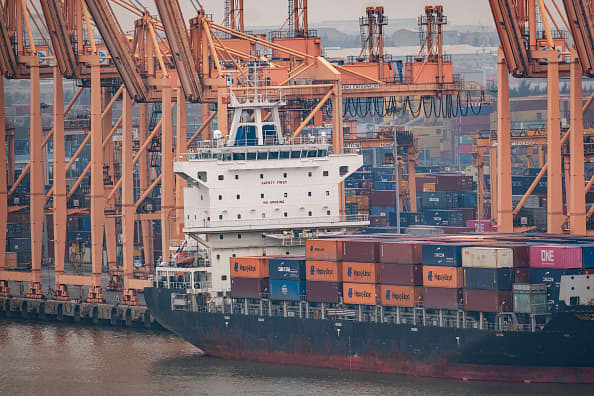
Vietnam has long been viewed as a successful example of embracing external trade, luring some of the largest companies in the world to establish hubs to manufacture everything from footwear to electronic products that grace shops around the world.
But now, concerns are mounting that U.S. President Donald Trump’s aggressive tariffs could derail Vietnam’s ambitious growth target despite diplomatic overtures to Washington that economists say are unlikely to shift policy soon.
Trump hit the Southeast Asian nation with a 46% import duty, one of the steepest among the over 180 countries targeted, dealing a heavy blow to a nation that derived nearly 90% of its annual gross domestic product from exports of goods and services in 2023, according to estimates from the World Bank.
The new levies could shave 1.2 percentage point off Vietnam’s economic growth this year, according to estimates by a team of economists at OCBC Bank, prompting them to lower their GDP forecast for the country to 5% in 2025. That would mark a significant dent to Hanoi’s ambitious target of “at least 8%” this year.
Growth in the Southeast Asian economy has already slowed this year, expanding 6.93% in the first quarter, down from 7.55% the quarter before.
Vietnam has emerged as a manufacturing hub for many companies that sell goods in the U.S., including multinational consumer goods retailers such as Nike, Adidas, Uniqlo and Apple Inc, because of a blend of relatively cheap labor costs and supportive government policies.
According to Nike’s annual earnings report for 2024, factories in Vietnam manufactured 50% of its footwear and 28% of its apparel products, while Adidas sourced 39% of its footwear items from Vietnam last year. Apple has also expanded its manufacturing presence in Vietnam in recent years, with around 20% of iPad production and 90% of Apple’s wearable product assembly like Apple Watch taking place in Vietnam.
Since the last U.S.-China trade war erupted during Trump’s first term in 2018, many Chinese manufacturers have also moved their production to Vietnam to avoid U.S. tariffs.
Vietnam’s trade surplus in goods with the U.S. more than tripled to a record high of $123.5 billion last year from less than $40 billion in 2018, according to U.S. data which pegged Vietnam’s goods exported to the U.S. at $136.6 billion in 2024.
The new levies announced by Trump last week could slash Vietnam’s total goods exports by as much as 40% this year, according to OCBC Bank. The bank cited data from Vietnam’s customs authority, which showed that Vietnam’s goods exports to the U.S. accounted for around 30% of its total trade turnover.
The new duties may also reduce the allure of setting up a manufacturing base in the country, weighing on foreign direct investment flowing into Vietnam.
But as is often the case with international trade statistics, there are discrepancies between the official numbers reported by the U.S. and Vietnam, partly because of differences in valuation methods.
Nguyen Thu Oanh, head of the inflation department at the statistics office, said Sunday the new U.S. tariffs could lead some foreign companies to move part of their production out of Vietnam, Bloomberg reported.
“The reciprocal tariffs on ASEAN and India will hurt the ‘China+1’ strategy that has benefited the region for some years now,” said the economists at OCBC Bank, but “it will take time for global supply chains to adjust.”
Tough road for deal
Aside from China, Vietnam will face a more challenging path to reach a deal with Washington than others in Asia, said Chetan Ahya, chief Asia economist at Morgan Stanley, thanks in part to its large trade surplus with the U.S. and its role in facilitating the rerouting of Chinese companies’ supply chains.
After a phone call with Trump last Friday, Vietnam’s party chief To Lam said in a readout that the country is willing to remove all levies on U.S. imports, bringing the tariff rate to 0% if the Trump administration does the same for Vietnamese exports to the U.S.
He also reiterated Hanoi’s commitment to boosting imports from the U.S. to reduce the bilateral trade surplus and encouraged American companies to increase investments in Vietnam.
In response to questions about Vietnam’s zero-tariff offer, White House trade advisor Peter Navarro said it was not enough to warrant a cancellation of the new levies.
“Let’s take Vietnam. When they come to us and say ‘we’ll go to zero tariffs,’ that means nothing to us because it’s the nontariff cheating that matters,” Navarro told CNBC’s “Squawk Box.”
The examples of “nontariff cheating” cited by Navarro included Chinese products being routed through Vietnam, intellectual property theft and value-added tax on goods, which Trump has criticized as hidden trade barriers.
In the lead-up to Trump’s widespread “reciprocal tariffs,” Hanoi sought to offer trade compromises, including lowering tariffs on several U.S. products, such as liquefied natural gas and cars, and approving a trial run for the Starlink satellite internet service in the country.
China has retaliated with a 34% additional tariff on all U.S. goods, but most Asian economies have chosen to refrain from direct retaliation.
Asian economies’ negotiation with the U.S. may not “yield desired results, especially for countries running large trade surplus with the U.S., such as Vietnam,” said Michael Wan, senior Asia economist at MUFG Bank.
While Vietnam’s negotiation with the Trump administration may “bear some fruits,” it is unlikely the U.S. will offer to cut tariffs “drastically” from proposed levels, he said.
China’s retaliation has complicated Vietnam’s negotiations with U.S., as policymakers worry Chinese firms might exploit the more lenient tariffs on Vietnam, Wan said.
Source: CNBC
